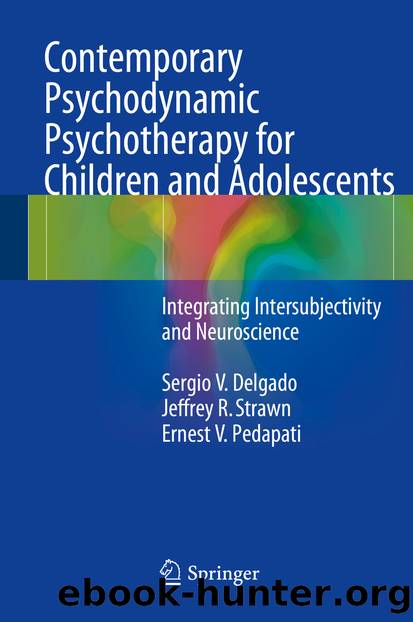Contemporary Psychodynamic Psychotherapy for Children and Adolescents by Sergio V. Delgado Jeffrey R. Strawn & Ernest V. Pedapati

Author:Sergio V. Delgado, Jeffrey R. Strawn & Ernest V. Pedapati
Language: eng
Format: epub
Publisher: Springer Berlin Heidelberg, Berlin, Heidelberg
Boundaries in Two-Person Relational Psychology
Boundaries in the two-person relational model receive the most critiques from clinicians practicing from a one-person model. In this regard, gratifying a patient’s wishes is viewed as a slippery slope, as it not only contaminates the transference, it may also complicate countertransference phenomena. Common examples in two-person relational psychotherapy of a psychotherapist gratifying a patient’s wishes, so as to move along the psychotherapeutic process, include allowing a child in treatment to borrow a toy, hugging a patient before the psychotherapist’s vacation, sending birthday cards to a child or adolescent, and answering questions about the psychotherapist’s personal life. Importantly, these moments occur when the psychotherapist intersubjectively experiences that gratifying the wish is in the best interest of the patient, as it provides a new corrective experience that may have been lacking and, thus, would not be considered to be crossing a boundary (a deviation from a framework). Without a doubt, regardless to which psychotherapeutic theory one adheres, enactments occur and represent a continuum, from subtle issues helpful to patients to enactments with behaviors that are clearly harmful to the patient (e.g., exploitation, sexual involvement). Due to the complex nature of the psychotherapeutic work with children and adolescents, we suggest the psychotherapist to have regular consultation with a trusted colleague when they subjectively feel a dilemma regarding their interactions with their patients.
Exactly what behavior from the psychotherapist defines a boundary crossing or violation is clearly a complex matter in child and adolescent psychiatry, and it must be viewed within the context of developmental issues. The “American Academy of Child & Adolescent Psychiatry Code of Ethics” (2009) is designed to provide child and adolescent psychiatrists an ethical framework of practice. Boundaries in two-person relational psychology need to be flexible, intentional, and part of a well-thought-out enactment. Similar to a boundary crossing, in two-person relational psychology, the relaxing of a boundary occurs with forethought and intention and aims to advance the psychotherapeutic process. In the above example of the adolescent who forgot to lock his bike, the psychotherapist by going with the patient to lock the bike is enacting a form of relationship that he hopes will create a new and sustainable neuronal pathway stored nonconsciously in an implicit relational form. This is to say that the adolescent learns to defer to social etiquette over the safety of one’s own valuable property.
Download
This site does not store any files on its server. We only index and link to content provided by other sites. Please contact the content providers to delete copyright contents if any and email us, we'll remove relevant links or contents immediately.
Periodization Training for Sports by Tudor Bompa(8237)
Why We Sleep: Unlocking the Power of Sleep and Dreams by Matthew Walker(6681)
Paper Towns by Green John(5163)
The Immortal Life of Henrietta Lacks by Rebecca Skloot(4564)
The Sports Rules Book by Human Kinetics(4367)
Dynamic Alignment Through Imagery by Eric Franklin(4199)
ACSM's Complete Guide to Fitness & Health by ACSM(4040)
Kaplan MCAT Organic Chemistry Review: Created for MCAT 2015 (Kaplan Test Prep) by Kaplan(3993)
Introduction to Kinesiology by Shirl J. Hoffman(3753)
Livewired by David Eagleman(3752)
The Death of the Heart by Elizabeth Bowen(3596)
The River of Consciousness by Oliver Sacks(3587)
Alchemy and Alchemists by C. J. S. Thompson(3501)
Bad Pharma by Ben Goldacre(3411)
Descartes' Error by Antonio Damasio(3261)
The Emperor of All Maladies: A Biography of Cancer by Siddhartha Mukherjee(3132)
The Gene: An Intimate History by Siddhartha Mukherjee(3085)
The Fate of Rome: Climate, Disease, and the End of an Empire (The Princeton History of the Ancient World) by Kyle Harper(3045)
Kaplan MCAT Behavioral Sciences Review: Created for MCAT 2015 (Kaplan Test Prep) by Kaplan(2972)
